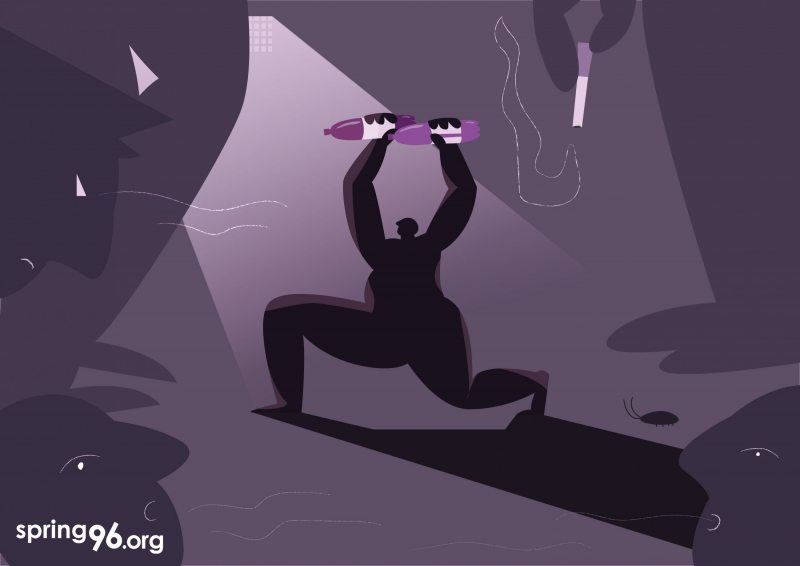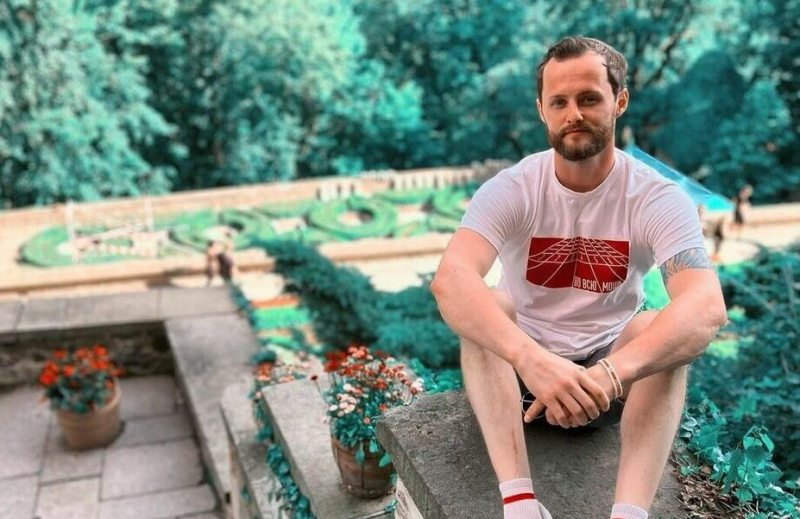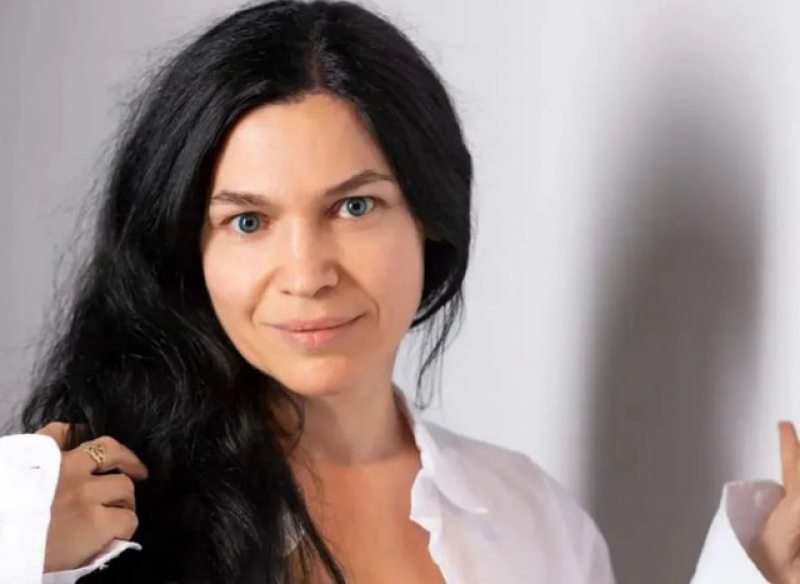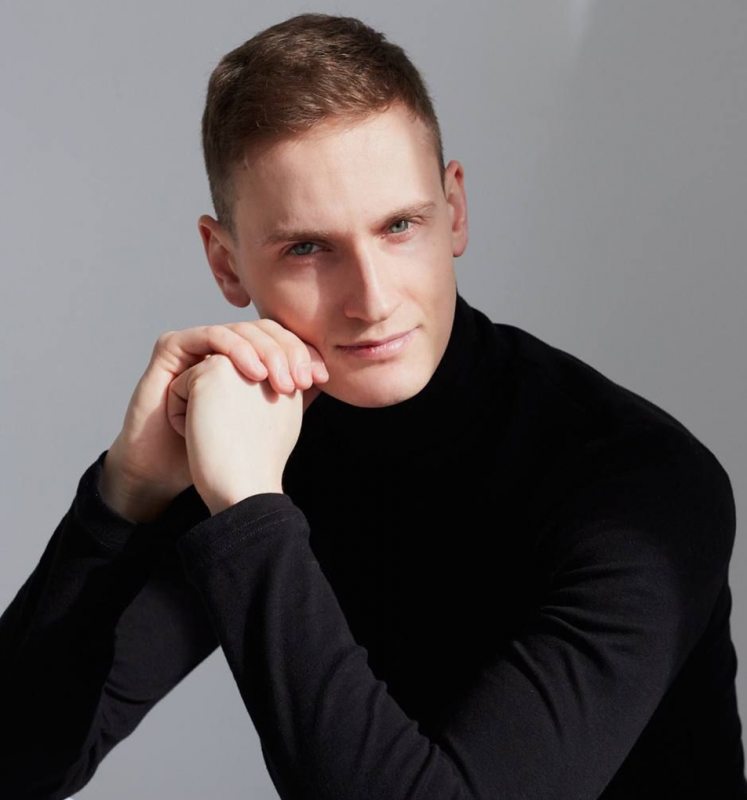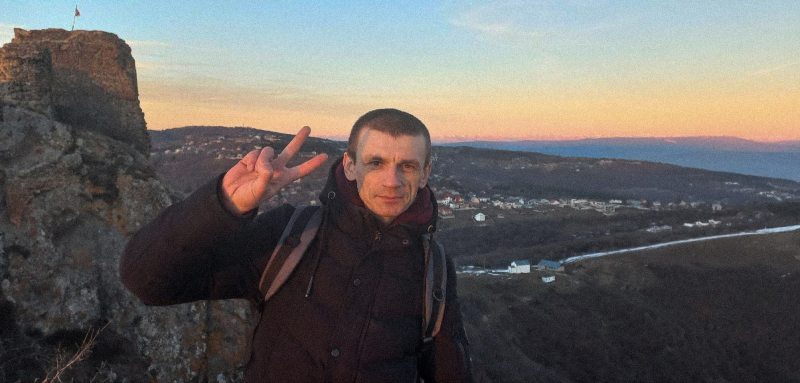Sports in custody: how the right turned into a method of pressure
In 2015, the UNESCO International Charter of Physical Education, Physical Activity and Sport declared access to physical education as a fundamental right of every person. This means that access to physical activity should also be provided to prisoners. However, in practice, people behind bars are not just deprived of this right — it becomes another method of pressure from the authorities, when impossible conditions are created for any, even minimal physical activity.
That is why Viasna asked people who were sentenced to several days in pre-trial detention centers, did time in colonies or punishment cells, to tell what conditions for sports were during their imprisonment and how the possibility of physical activity affected their state.
Pre-trial detention centers: impossible conditions for sports
The worst conditions for a workout are in temporary detention facilities, where people do their days of detention: overcrowded cells, severe psychological state in the first days after detention, lack of the most necessary hygiene products make even minimal physical activity impossible. Professional gymnast and Cirque du Soleil performer Siamyon Bukin says that while serving his 15 days in November 2020, he could hardly work out, which for him was tantamount to torture.
"For the first six days in Zhodzina, there were 18 people for a six-person cell," he recalls. "Therefore, there was no place or desire to work out: I was in such a state that I just didn't want anything. Only on the fifth day we were taken for a walk into a room, about 5x5 meters, and there was a horizontal bar — I could not ignore it. Even taking into account a short break, it was hard to pull up, and the next day my muscles ached, which was nice.
When I was transferred to Mahileu, there was a bigger room there: I had the opportunity to do some push-ups, handstands, squats a couple of times. I just wanted my body not to hurt because that's exactly what happens without workouts — it is a habit I have. I remember that there was a lot of energy that had nowhere to go, and there were not enough sports equipment for normal activities. For people like me, the lack of physical exercise is severe abuse, even in psychological terms."
After his release, the physical state of Siamyon returned to normal in about a week. Psychologically, it was somewhat easier, since in professional sports he adapted to the pressure: the guy notes that the taunts of the policemen did not seem to him unusual compared to the dictatorial methods of one of his coaches.
A political prisoner Ina Shyrokaya, who is a yoga coach, said that women compensated for the terrible conditions with yoga classes, meditations, the Om mantra, and pranayamas.
Pre-trial detention center: limited space and lack of air
When you get to a pre-trial detention center, there is not enough space in the cell to just move, not to mention adequate sports. However, with limited walks and lack of sports equipment, people try to find any opportunities to move.
Ina Shyrokaya tried to do exercises because she understood that immobilization would lead to sad consequences. The political prisoner also gave other women arguments in favor of workouts and offered techniques to relieve their stressed state, but tried not to cross other people's personal boundaries. In the cell, they had stretching workouts on beds and tried to learn to do the splits; during their walks, the women also showed each other various exercises and constantly walked around the small courtyard: for ten minutes in each direction, so as not to feel too dizzy.
"After prison, I limped for another month, as I was used to walking around in a small confined space," says Ina. "I saw that people had problems with joints, lost or gained a lot of weight. I was able to remain in good physical shape only because I used all my yoga coach skills. I transformed some exercises: in order not to lie down on a dirty stone floor, I removed certain asanas from Greeting to the Sun and Greeting to the Moon which had to be performed lying down. We performed some inverted asanas only on the upper beds and even gave up our places for the duration of the exercises to those who "lived" on the lower beds. I made sure to do the morning Bhastrika and Kapalabhati pranayama: it was loud for six in the morning and I was uncomfortable with the sounds made. Once one of the cellmates said that it sounded disgusting — I had to explain the benefits and why I couldn't professionally break the practice."
And although Ina tried to introduce others to the workouts, people were not always motivated enough, so soon she switched to independent exercises. However, before being released, she left yoga exercises and correct poses of asanas that she remembered in a common notebook for writing poems and songs. Ina notes that it was important for her to support others in this way.
The political prisoner also says that she lost her skill level and, after leaving the pre-trial detention center, she started everything from scratch. In addition, even outside of prison, her daily practice caused disturbing associations, so she cannot return to personal meditations to this day: now they cause PTSD. The woman found a way out only in practices with other participants, where she can feel safe.
"At first, I was out of breath even from easy exercises, my eyesight deteriorated badly, dental problems began, long-forgotten pyelonephritis and kidney problems came out. And, of course, mental problems," Ina recalls. "It is impossible for to get out of prison remaining a mentally healthy person. I needed serious rehabilitation, which is necessary to this day. Due to my urgent flight, I was unable to undergo a full medical examination, pass tests (there were people with HIV and hepatitis in the cell), and take the necessary medications. I hope that I will recover with time. I work with a psychologist, I continue to teach and share my experience, I try to provide myself with timely medical care, I take vitamins. I pray that everything falls into place. Every time I see the colossal damage that I have suffered because of the revenge inflicted on me be the state, I remember those who have not yet been able to escape from the clutches of the punitive system."
Political prisoner Tatsiana Barysovich said that physical exercises helped her to keep healthy and not go crazy.
"When you train, the mind gets cold," she said. "Every day, little by little, I did exercises, squats, performed exercises on the abs, legs, and back on the bed."
She also advised sending letters to political prisoners with examples of exercises that can be performed in a confined space.
"We had a sports cell because Maxim Znak was with us," says political prisoner Andrey Shliapau. "He pestered us and constantly encouraged us to work out. When he was transfered to another place, not everyone continued to do it. I was interested in exercises with my own body weight even before I was detained, so, based on that experience, I made up a training schedule for myself in the pre-trial detention center, as far as it was possible. However, it was necessary to watch out not to be particularly noticable: I have heard that in certain places of detention for doing sports they can put you in a punishment cell, beat you or make a record that you are preparing to escape."
Andrey tried to organize his workouts in such a way that he could practice at a time when fewer people smoke: this is usually the time after lunch, when everyone goes to their beds and the space in the cell is freed up. On Mondays, the political prisoner squatted with empty half-liter bottles put into a bag. On Wednesdays, he did push-ups. On Fridays, he pulled himself up on the bunks with two hands.
"Everything there was limited solely by your imagination," explains Andrey. "If you want to workout, you will do it. I remember what a luxury it was when three of us were taken out in winter to one of the largest courtyards on the Volodarka — I was able to just run around for 15-20 minutes in a circle. Those were the days when we were allowed to go for walks with a part of the people from the cell, closer to the summer the rules were changed: if someone from the cell did not want to go for a walk, everyone stayed."
Political prisoner Vital Zhuk talks about an important aspect of workouts in a pre-trial detention center compared to a colony. While you are in a pre-trial detention center, you have the opportunity to allow yourself to spend more energy on sports because there is an opportunity to eat extra calories by buying powdered milk, fruit, baby food or by eating food from care packages.
"But it is impossible to properly work out in a cramped cell," says Vital. "In a 12-bed cell, only two people can walk at the same time, while the others are sitting on the benches, but there is not enough movement there, since walking also lasts a maximum of an hour a day — it's so easy to wither. That's why people started doing exercises. Someone chose a relatively empty place and free time to walk around the cell, someone lay down on the bed and trained the abs. You could fill empty juice bottles with water to make a kettlebell, or buy salt. The guards understand that this is how the guys do sports, so they take away water and salt during inspections, and recently they banned buying salt in bags altogether."
There were other methods of pressure on those who tried to do physical exercises in a pre-trial detention center: if the guards noticed that someone was taking off their T-shirt to wash themself with water after a workout, they ran into the cell and scared us with the punishment cells and violation records because officially being in the cell without a T-shirt is a violation of the order. Although this did not stop men: for example, a political prisoner Svyataslau Herasimuk managed to run in the cell on the spot, creating an imitation of a treadmill.
"All this is the Stalinist system," says Vital Zhuk. "Restrict a person's movements so that they atrophy. You can't work out properly — even to take a walk. When 12 people enter the exercise yard at the same time, it is impossible to walk together from wall to wall. Therefore, we stood in a circle and walked first clockwise and then abruptly switched. So everyone could move at the same time."
Colony: sport as a privilege
In the colony, there are slightly more opportunities to keep yourself fit, the space is less limited. However, taking into account absolutely no high-calorie food, a small amount of money for groceries from a local shop and small care packages, with good physical activity, a person cannot eat properly. Often the best solution in such a situation is not to exercise at all, so as not to harm yourself.
Vital Zhuk says that the pressure on prisoners of the penal colony No. 2 in Babrujsk who want to do sports begins at a two-week quarantine, which everyone must pass before they are transferred to their detachment.
"In quarantine, we were kicked out into the cold every two hours," Vitaly recalls. "And there just to warm up a little Yura Bialko and I tried to lean on the bench and do push-ups. But as soon as we started, the guards ran out and began to say that we could not do this because it could be recorded as an escape attempt. Therefore, if we continued to do push-ups in quarantine, the second person stood guard."
In the detachments there are so-called "lokalka's" – a space surrounded by a fence which is used by two or three detachments. There are horizontal bars where you can practice in your free time. However, if people from three detachments want to use them at the same time, a number of inconveniences arises: people have to spend all their free time to wait in line. By the way, during these couple of hours, prisoners also have a chance to run without risking getting a "prone to escape" record. But the best thing in the colony for physical activity is a gym.
"This is a dream, considering that it is difficult to practice on the horizontal bars in winter or autumn," says Vitaly Zhuk. "But the big question is who gets there. The gym turns out to be the same privilege as an additional care package, a meeting with your relative or some other positive thing on the part of the administration. Most of those who work out there are custodians, people who cooperate with the administration. Yes, they can also visit the gym only in their personal time, but they do not have such restrictions on the things they can buy: they can afford a proper healthy lifestyle. Political prisoners are not allowed there from the very beginning."
However, the situation is completely different in punishment cells. People do certain physical exercises there mostly to keep warm especially if they get there in autumn or winter. If a person gets there in the summer, they do exercises at least so that the muscles do not atrophy: in conditions of limited space, joints, bones, and spine begin to ache. In addition, the prisoner is even more restricted in nutrition: in the punishment cells it is generally impossible to receive tcare packages, in cases of lesser punishment their weight can reach a maximum of two kilograms.
"There you have to balance between available nutrition and physical activity, so that hunger does not consume you before lunch," says Vital Zhuk. "Essentially, you can do push-ups, squats or train your abs there. The latter is very difficult to do: when you do it on a hard floor, the spine starts to hurt again. Imagine how a person works out in winter: they are weak, hungry, but have to do exercises to keep warm. As soon as I tried to do minimal exercises, I felt sleepy. All these circumstances in the end only harm the person. It's very difficult psychologically: exercise both weakens and warms you. And such stress happens to people every day in punishment cells. A person in such conditions begins to atrophy — to lose weight, to freeze constantly, to have a lack of nutrients. This is the destruction of a person without direct physical contact, just a genocide in which everyone participates. For example, Yauhen Prapolsky went to exercise on horizontal bars, but after frequent incarceration in punishment cells he said that he stopped practicing because he felt constant weakness."
It turns out that for an incarcerated person it is possible to exercise more or less in a colony if there is access to horizontal bars and running. However, in a situation when numerous political prisoners are not released from punishment cells, it is difficult to assert that the prisoners' right to physical activity is realized at least minimally. This causes irreparable harm to people's health, which is unlikely to be compensated in any way.



